PROTECTING REAL ESTATE WITHOUT AN OFFSHORE TRUST: Now It Can Be Done!
Volume XXIV • Number 1 • April – May 2017
INTRODUCTION.
We have previously discussed protecting real estate through the use of a structure which included an offshore trust (APN XI, No. 3). We have now developed and offer a strategy which provides the same protection for real estate when you don’t have an offshore trust.
DESCRIPTION.
If you hold real estate in a U.S. entity, such as a trust, a corporation, partnership, or LLC, the strategy works like this: The U.S. property owning entity will form a single member LLC in the Cook Islands or other offshore jurisdiction (the LLC will elect to be disregarded for U.S. income tax purposes). The LLC will be managed by an independent offshore management company pursuant to a specialized operating agreement we have developed (more on this below).
After the U.S. property owner obtains appraisals of the real estate, an unrelated offshore lender will loan the property owning entity up to 95% of the value of the equity in the property (equity = value in excess of existing liens), and receive a recorded mortgage or deed of trust (as appropriate under state law) as security. The loan proceeds will be transferred to the offshore LLC as a contribution to its capital and invested in a certificate of deposit issued by an offshore bank (with no U.S. connections).
HOW IT WORKS.
 Utilizing this strategy, the valuable equity in the real estate has effectively been transferred offshore – beyond the reach of any U.S. court. From a creditor’s perspective, the property has been rendered “not worth going after”. But what if a U.S. court orders the U.S. property owner to order the LLC manager to liquidate the CD and pay off the lender (thereby exposing the equity to the creditor’s claim)? That’s where the specialized operating agreement comes into play. The formation documents of the LLC and the operating agreement provide that the LLC is managed by a manager (who does not have to be a member).
Utilizing this strategy, the valuable equity in the real estate has effectively been transferred offshore – beyond the reach of any U.S. court. From a creditor’s perspective, the property has been rendered “not worth going after”. But what if a U.S. court orders the U.S. property owner to order the LLC manager to liquidate the CD and pay off the lender (thereby exposing the equity to the creditor’s claim)? That’s where the specialized operating agreement comes into play. The formation documents of the LLC and the operating agreement provide that the LLC is managed by a manager (who does not have to be a member).
An independent director company is also appointed which has oversight with regard to the manager’s actions. The operating agreement provides that the manager can only act on directions voluntarily given by the member (the U.S. property owning entity). If the manager suspects that the member’s instructions are not voluntary, it is duty bound to decline to act on those instructions.
How can the manager be certain that instruction is voluntary?
The operating agreement provides that the manager can require a statement under oath to that effect. No court in the U.S. can order a person to lie under oath – that would be a violation of the 5th Amendment protection of our Constitution. Thus, the lien and the CD remain in place and the property remains protected to that extent.
U.S. TAX CONSIDERATIONS.
Unlike the foreign trust, the disregarded foreign LLC will not have to file Forms 1040NR, 3520, or 3520-A. Of course, the appropriate box on the borrower’s U.S. tax return will have to be checked indicating the foreign account (the CD), and Form 8858 will be attached to the income tax returns of both the “tax owner” and the “direct owner” of the disregarded foreign LLC.
In addition to the foregoing filings, FinCen form 114 (Report of Foreign Bank and Financial Accounts), commonly referred to as the “FBAR”, must be filed annually to report interests in foreign bank (such as the certificate of deposit) and financial accounts (if the aggregate value of all foreign financial accounts exceeded $10,000 at any time during the calendar year being reported). This form should be filed by the U.S. borrower, and, depending upon the type of entity of the U.S. borrower, the filing may also be required by its beneficial owners. Finally, taxpayers with specified foreign financial assets that exceed certain thresholds (again, that would be the CD) must report those assets to the IRS on Form 8938, Statement of Specified Foreign Financial Assets, which is filed with the filer’s income tax return.
CONCLUSION.
We provide all of our asset protection clients with a detailed federal tax compliance memo, together with sample forms. In our experience, clients whose CPA’s follow our suggested compliance regime never have an issue with the IRS regarding their offshore planning.

Contact us to get answers to your asset related questions, and we’ll explain how to move forward planning the right type of real estate asset protection. Call 305-447-0061






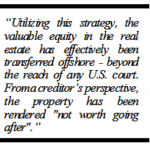


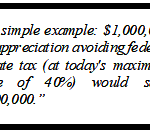
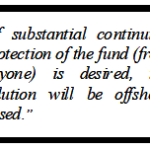



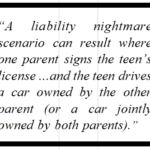
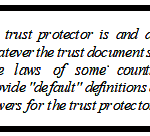
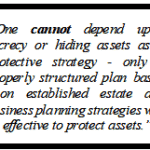

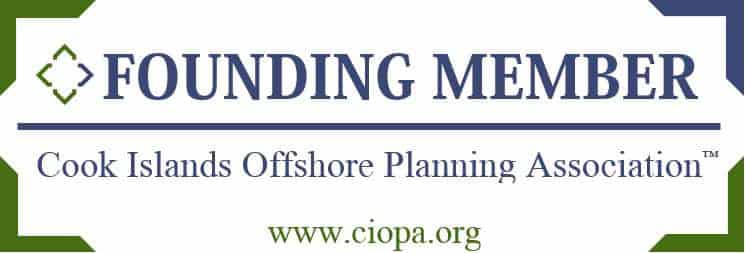
Connect
Connect with us on the following social media platforms.